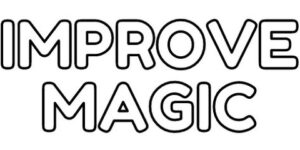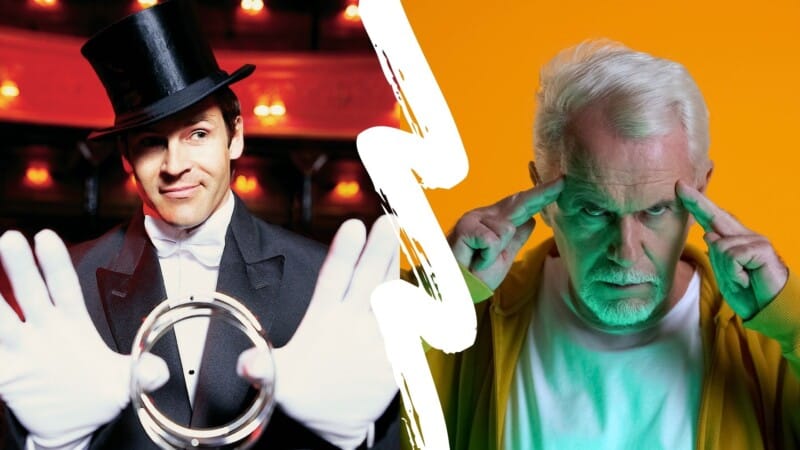An outside may believe that anyone who performs “tricks” on a stage is called a magician.
In fact, there are different types of magicians, and some do not want to be associated with certain other genres.
In this article, I want to explain the difference between a magician and a mentalist.
In doing so, we will also briefly consider the different types of performance.
What is the Difference Between a Magician and a Mentalist? Magicians are using sleight of hands, gimmicks, stage, and showmanship to achieve their illusions while mentalists are using psychology, observation, and subconscious reading of human body language to demonstrate their mind-reading skills.
Table of Contents
Magicians
In delving down into the heart of Magic and identifying the different genres, we start with a basic split between Stage Magic and Paranormal Magic.
Stage Magician
A stage magician is a performer who entertains the audience by performing tricks or illusions that appear impossible.
The performer claims no pretense of real magical powers.
>> Visit No. #1 Mentalism Course! <<
The audience understands it is a trick, and they are puzzled about how the performer can do it.
Paranormal Magic
In paranormal Magic, the practitioner claims what he does is due to some supernatural power.
This style is the oldest of the two and is often claimed to be one of the oldest performing arts in the world.
For example, the trick that involves a ball and three cups were first performed in 3 B.C.
We will not talk more about Paranormal Magic as today, this has fallen from favor.
Magician or Illusionist?
The other term you may hear is “Illusionist.” All Magic is technically illusion, but an illusionist performs on larger scale performances that may require assistants.
Types of performance
To make it easier to discuss styles of Magic later in the article, I will quickly go through a list of some of the most popular styles.
Parlour Magic
This term has gone out of fashion, and it is now more often called “Stage Magician.”
Close-up Magic (table magic)
The small audience is close to the magician. It might even be a one to one performance.
Props are generally everyday items, like coins, and cards. A popular form of entertainment at dinner.
Escapology
This style involves escaping from some form of restraint. The most famous exponent was Harry Houdini.
PickPocket Magic
The magician will typically distract the audience by performing a magic trick, and use that distraction to pick pockets, remove ties, or take other personal items. Great for small groups or one to one.
Children’s Magic
Normally performed at birthday parties and schools. A form of Magic aimed at children with lots of audience participation.
Mathemagic
Sometimes performed by children’s magicians, and sometimes Mentalists.
Street Magic
This style is a form of busking using Magic performances. Normally to a small group or one on one.
There is a variation aimed at T.V. Where the Magic is performed, and the emphasis is placed on the audience reaction.
Bizarre Magic
A very theatrical form of performance that is focused on horror, fantasy, etc.
Shock Magic (or Geek Magic)
Originating in circus sideshows and freakshows. The magician performs an act that is shocking like swallowing razor blades.
Quick Change Magic
This style typically involves performers who can change clothes in rapid time.
Camera Magic
Designed for performance on a T.V. or screen. The tricks depend on the viewing angles and editing of the film. It may involve paid extras posing as audience members.
Classical Magic
A modern take on the elegant performance from the 19th and 20th centuries. Very dependent on the setting.
Mentalists
Now we will take a look at Mentalists.
A mentalist will convince the audience that they possess superior mental powers and highly developed intuition. Many psychological skills will be utilized.
Some performers retain a pretense that their abilities are because of supernatural skills.
However, more commonly now, performers are happy to admit that their abilities are due to a high level of people skills.
There is some conflict between these two camps with the traditionalists wanting the public to believe in the supernatural, and objecting to the modernists telling the truth.
Magic vs. Mentalism
While Magicians may occasionally perform some Mentalism, Mentalists rarely perform Magic in their shows.
Two of the big-name Magicians who also include Mentalism in their acts are David Copperfield and David Blaine.
How Magic is done?
Let’s take a look at one of David Best Known Tricks
This trick was the most stunning of all his tricks and very cleverly worked out. I am referring to the famous trick where Davis appeared to move the Statue of Liberty.
The trick took place back in 1983 and in front of millions of people on T.V., and a small number of people live (about 24), he did the impossible.
What is the secret?
In the Illusion, David Copperfield raised a sheet in front of the Statue of Liberty, and then when he dropped it, the Statue was gone.
In reality, the Statue was hidden behind one of the towers that held the curtain up.
What happened was that David had the watchers mounted on a large platform. He used loud music to hide the sound and vibrations. He rotated the platform so that where the Statue had been behind the curtain, it was not hidden behind the tower when the curtain was dropped. He had changed the viewing angle.
A very clever illusion that was calculated to get the correct effect. That was an example of Magic Illusion.
How Mentalism is done?
Here are three ways that mentalists do the “impossible.”.
Look at the lips
In the performance, the Mentalist will often say something like, “Think of a word or number and keep repeating it to yourselves.”
The Mentalist goes on to talk about something else, and the volunteer is repeating that word to themselves. They become unaware that they have started moving their lips, making the word without actually speaking.
Misdirection
One good way of making someone think you are reading their mind is by planting an idea into their head.
The Mentalist, through his words and body language, implants an idea that the volunteer will focus on.
For example, during the routine keep, keep using the word “Watch” keep glancing at your watch and then ask them to think of an accessory, as you look at your watch again, without realizing why they will probably think of a watch.
Go Fishing
The Mentalist will often make statements like I see a river, does that mean something to anyone?
Chances are in some way a member of the audience will have some connection to “river,” and they will step forward.
You already have them half-convinced you can read their mind. Just repeat, and carry on getting information from them. If you hit a wall you can always just try another word.
Cold Reading
I am going to finish on a set of techniques used by Mentalists.
Using these techniques a trained person can easily find out a lot of information about a volunteer.
There are many factors used by the Cold Reader.
The basis of the system is that you start out making wide-ranging statements that are almost certain to be true.
For example, “between the ages of 13 and 15 major changes happened in your life.” (of course, they did we all have changes at that age)
But the subject hears this and agrees, you have passed the first test as a cold reader. Starting with generalized statements, the trained cold reader will watch the reactions of the volunteer to each statement and gradually hone in, using what is being learned.
You and I would take ages to pick up on the slightest bit of body language.
Still, an experienced practitioner can pick up things very easily.
As data is gathered, you can start to make more targeted statements that are still probably right.
When you reach this stage even if you make a mistake, you can tell the volunteer, they are wrong and to sit and think about it for a while.
They will twist what you said to suit their situation.
The difference between mentalists and Magicians
You see the difference: A Magician is arranging physical props to create an illusion, a Mentalist is probing mental tricks to give the illusion they are doing something.
A Mentalist will have lots of little tricks up his sleeve that makes it appear he is reading your mind.
For example:
Think of a Number – don’t tell me
Multiply it by 3 (again don’t tell me)
Keeping it secret still add 6
Divide this number (whatever it is) by 3
Subtract your original number
(THE ANSWER WILL ALWAYS BE 2)
You say: The answer is 2 (rounds of applause).
OK, there wouldn’t be rounds of applause, but you would be right.
The trick is to find a way to use that mathematical certainty. Perhaps by converting numbers to letters.
It is by thinking of ways that you can use tricks like this, disguising them, that you can create mental illusions.
These skills combined with the three secrets and many more tricks (that I will not tell you) that allows you to become a Mentalist.
Here are some more tips on the psychology
Mentalists are using psychology to achieve their illusions.
They need to focus on building the right atmosphere and tension.
Here are some key psychology principles that every Mentalist needs to master:
- Look smart
- Be modest, do not make OTT claims about your abilities
- Emphasis on the subject that the success depends on them cooperating
- Explain that they should fit the information you provide to their lives
- Use stock phrases to play for time if you get stuck (you have lost connection etc.)
- Start senses with, “I am sensing,” or “I am feeling”
- Give the impression you know more
- If they think you have a serious secret bit of information, they will assume you know everything and will open up.
Can You Learn Mentalism?
Mentalism is part of the magic and can be learned if you have an interest in it.
Nowadays, you don’t even attend a live course or seminar – you can access all materials from the comfort of your home.
I recently tried this online course on Mentalism that I can honestly recommend to you.
It reveals the principles of Mentalism in easy to understand manner that is understandable even for beginners.
If you’re interested in learning Mentalism, this is really the best training I tried and that I always recommend to my students.
Conclusion
As a Magician, you are a master of physical props, sleight of hand, and an expert at distraction.
Guiding the attention of your audience anywhere other than where you are doing something.
As a Mentalist, you are a master of the mind and psychology. These are your tools.


